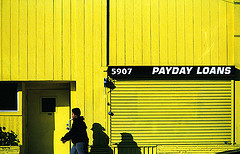Report: Some Credit Unions Are Still Involved In Payday Lending

(eyetwist)
In 2010, the National Consumer Law Center alerted the National Credit Union Administration — the federal agency that regulates and charters credit unions — to 58 unions that were getting around the established usury cap, mostly by tacking on fees that weren’t technically part of the APR, or by referring account holders to payday lenders (or credit union service organizations) who use the unions’ name and brand (and presumably paying finders fees to the unions) in setting up loans that fall outside of the NCUA’s purview.
Following that 2010 report, 52 of the 58 credit unions put an end to the practice, but a small number of unions persist in making, or allowing their names to be involved in, short-term loans that charge triple-digit interest to borrowers.
“The vast majority of credit unions offer responsible loans to their members,” writes the NCLC in its letter [PDF] to NCUA Chair Debbie Matz. “Unfortunately, a few credit unions
threaten to taint the rest of the industry by offering predatory loans to their members.”
The NCLC says that one credit union in California has been making 14-day loans that advertise a 15% APR, but which also charge a $32 fee. When you add in that fee, the effective APR on the loan jumps to 223%.
Then there are five credit unions in Florida, all of which allow one payday lending operation to use their names when offering short-term loans with APRs of 269%, nearly 10 times the maximum interest rate the credit unions would have been able to get on similar loans.
You can see the full list of credit unions involved in making payday loans here.
As the NCLC points out, federal bank regulators recently began considering ways to further rein in predatory lending by federally insured and chartered banks. And the NCUA has previously advised its member institutions of the problems involved with offering payday loans.
“More needs to be done,” writes the NCLC. “NCUA has clear authority to stop predatory lending by credit unions. When manipulation of the APR by federal credit unions is the problem, NCUA should use its authority under the Federal Credit Union Act and the Federal Trade Commission Act to forbid FCUs from evading the FCUA 18% usury cap by charging
fees that vastly outstrip the finance charge and that manipulate the APR.”
As for those credit unions that allow payday lenders to use the union’s name when making high-interest loans, the NCLC suggests that regulators should refine the NCUA’s finder’s fee rule to ensure that credit unions “are not incurring third party risk and profiting off of loans that are illegal for them to make directly.”
Want more consumer news? Visit our parent organization, Consumer Reports, for the latest on scams, recalls, and other consumer issues.

